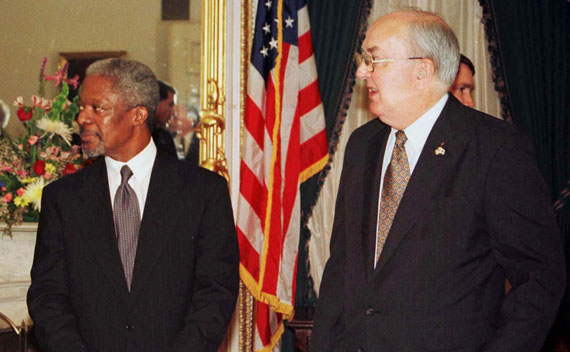U.S.-UN Relations: Back to the Future?
More on:

Toxic partisanship on Capitol Hill. A looming budget showdown. A first term Democratic President struggling to explain an African military adventure, while empowered GOP leaders chide him as a foreign policy amateur. Seeing an easy target, House Republicans take aim at a bloated and dysfunctional United Nations, insisting on draconian cuts. Welcome to the latest crisis in U.S.-UN relations.
We’ve returned, apparently, to the mid-1990s, when Clinton administration missteps from health care to Somalia helped bring Newt Gingrich and the Republican Revolution to power in the House. The GOP’s “Contract with America” prohibited U.S. troops from serving under UN command and promised “to cut U.S. payments for peacekeeping operations.” The Clinton administration developed a more restrictive peace operations policy, but Congress sought more, beginning a broader policy of withholding U.S. payments to the UN’s regular and peacekeeping budgets in an effort to force reform on the world body—contingent on reform “benchmarks,” including zero nominal UN budget growth.
Thanks to the indefatigable Richard Holbrooke, who cajoled and browbeat member states, the U.S. ultimately won agreement on a reduced share of U.S. assessments for the UN’s regular and peacekeeping budget. Under the Helms-Biden agreement, these declined from 25 to 22 percent and 30 to 26.5 percent, respectively, in return for the United States paying its arrears. But the discount achieved came with a high price: it undermined UN peacekeeping and other critical UN capabilities; distracted the U.S. diplomatic corps from the UN’s real security agenda, and alienated U.S. allies and potential partners in New York and member state capitals.
Fast forward to 2011, and GOP house leaders are again taking potshots at the United Nations. Illeana Ros-Lehtinen, Chair of the House Foreign Affairs Committee (HFAC) is leading the charge. “The fact that the U.S. continues to contribute billions of taxpayer dollars every year to an unaccountable, unreformed UN is no laughing matter,” she told The Hill. A particular object of Ros-Lehtinen’s ire is the admittedly flawed Human Rights Council (UNHCR), which she considers a “rogue’s gallery” composed of “pariah states.”
No doubt the HRC has flaws. It lacks criteria for membership, includes (and shields) too many human rights violators, and focuses too much on Israeli conduct rather than more egregious assaults on human dignity. But the United States cannot ignore tangible gains it has achieved in the HRC over the past year. These successes include resolutions suspending Libya from HRC membership in March 2011, creating a special rapporteur to assess violations in Iran, and the most recent call for an investigation of the Syrian government.
Given heavy U.S. reliance on the United Nations, the GOP strategy of nickel-and-diming the UN is penny-wise and dollar foolish. Today, more than one hundred thousand UN “blue helmets“ participate in fifteen UN peace operations around the world—giving the UN the second largest global deployment of armed forces after the United States. The United States has authorized each of these missions, which range from stabilizing strife-torn Haiti to deterring atrocities in Sudan, because each is in the U.S. national interest. Meanwhile, UN functional agencies like UNHCR and the World Health Organization (WHO) are saving the world’s refugees and alerting the world community to potential global epidemics at a relative pittance.
In FY 2009, U.S. contributions to the entire UN system totaled $6.347 billion—less than the United States spends on military operations each month in Afghanistan. UN peace operations cost $7.3 billion (the U.S. share is $1.94 billion). As my colleagues Micah Zenko and Rebecca Friedman argue, this is the precise moment to bolster, rather than starve, UN peacekeeping. For its part, the UN’s regular budget amounts to $5.16 billion (with the U.S. share being approximately $1.14 billion). In addition, the United States contributes slightly more than $3 billion in “voluntary” contributions to specialized UN agencies and programs, ranging from the UN Children’s Fund (UNICEF) to the WHO.
Given America’s parlous fiscal situation, the U.S. international affairs budget cannot be spared the axe entirely. But history suggests that a Congressional strategy of “withholding” payments in an effort to micromanage reform at the United Nations is counterproductive, succeeding mainly in antagonizing developing countries in the Group of 77 (G77) and “poisoning the atmosphere for reform.” Recognizing this reality, the George W. Bush administration backed down in summer 2006 from its gambit to condition approval of the UN’s biennial budget to management reforms, to avoid a looming shutdown of the United Nations.
More worrisome is Ros-Lehtinen’s proposal that the United States abandon a formal legal obligation to meet its assessed contributions and place all U.S. contributions to the United Nations on a voluntary basis (something former U.S. ambassador John Bolton has also recommended). Such a strategy is irresponsible. Other countries will surely follow America’s example and cherry-pick what aspects of the United Nations they want to see continue. Troop contributing countries like India, moreover, could retaliate by cutting back even more their own military contributions to peace operations.
Yes, the United Nations does remain in desperate need of management and institutional reform. Priorities include strengthening the Office of Internal Oversight Services, instituting more flexible human resource policies, reforming an opaque procurement system, reviewing mandates older than five years, and bolstering of the UN ethics office, whistle-blower protections, and financial disclosure requirements.
To advance these objectives, the United States must work with like-minded countries and Secretary-General Ban Ki-Moon, who has just been rehired for second five-year term. Despite his commitment to management reform, the charisma-challenged Ban has been a disappointment to date. Washington must bolster his determination to change deeply engrained habits at the UN, while cultivating common approaches with moderate developing countries that have an inherent stake in a smoothly functioning United Nations. Dogged diplomacy, not righteous indignation, must rule the day.
More on:
 Online Store
Online Store